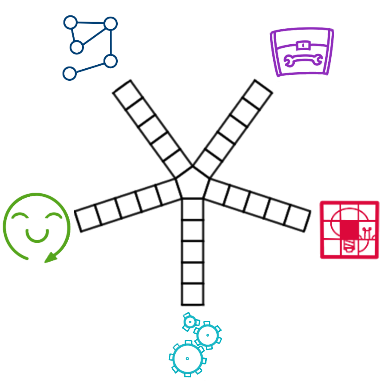Or search by topic
Number and algebra
Geometry and measure
Probability and statistics
Working mathematically
Advanced mathematics
For younger learners
Published 2020
What Makes a Good Mathematician?
How do you know if you are good at Maths?
What would you say if I asked you that question? Take a moment to consider your answer before you read on...
2020 has been a rather odd year so far, with many of you learning at home while schools have been closed. You may be enjoying the challenges and opportunities that this brings, but there may also be moments when you miss learning with your friends and teachers. So how do you best prepare for returning to the classroom? What will your teacher be looking out for?
Here at NRICH, we are offering a range of problems for you to work on, which we know will stand you in good stead when you do go back to school. These tasks will give you the chance to develop the five key ingredients that we think characterise successful mathematicians.
The five pathways in the image below represent the five ingredients. We hope our descriptions of each pathway are helpful, and offer you ways of talking about your own mathematical capabilities.

Understanding - Maths is a network of linked ideas. I can connect new mathematical thinking to what I already know and understand.
Tools - I have a toolkit that I can choose tools from to help me solve problems. Practising using these tools helps me become a better mathematician.
Problem solving - Problem solving is an important part of Maths. I can use my understanding, skills and reasoning to help me work towards solutions.
Reasoning - Maths is logical. I can convince myself that my thinking is correct and I can explain my reasoning to others.
Attitude - Maths makes sense and is worth spending time on. I can enjoy Maths and become better at it by persevering.
This model gives a real sense of the equal importance of the five pathways and that a recipe depends on all the ingredients working together. This is where NRICH comes in!
As you immerse yourself in NRICH tasks, you will need to make use of the five ingredients, and you could use the sheets on this page to reflect on how you can become a better mathematician.
Why not take a look at the problems we have published in our primary and secondary student features, and be well prepared for the mathematical challenges that will be coming your way when you return to the classroom?
If your teacher, parent or carer has a Twitter account, you could ask them to share your thoughts using the hashtag #nrichmathsAtHome.
References:
Kilpatrick, J., Swafford, J. and Findell, F. (eds) (2001) Adding It Up: Helping Children Learn Mathematics. Mathematics Learning Study Committee: National Research Council.
Related Collections
You may also like
Being Curious - Primary All Resources
Resources for primary children to help them to develop their curiosity.
Being Collaborative - Primary All Resources
Resources to help primary children to be more collaborative.

